當前位置: Language Tips> Focus 專題> 2016奧運會> 雙語奧運
分享到
菲爾普斯8日亮相里約即帶領美國隊奪得男子4x100米自由泳接力賽冠軍。外媒更注意到他頸、肩和背上的“圓形瘀傷”,其實是拔罐造成的紅印。原來不少美國運動員,如體操選手拿度亞(Alex Naddour),或是泳將庫格林(Natalie Coughlin)都有拔罐的習慣,以消除肌肉疲勞。
原來,拔火罐已經跟隨奧運選手走向世界了!
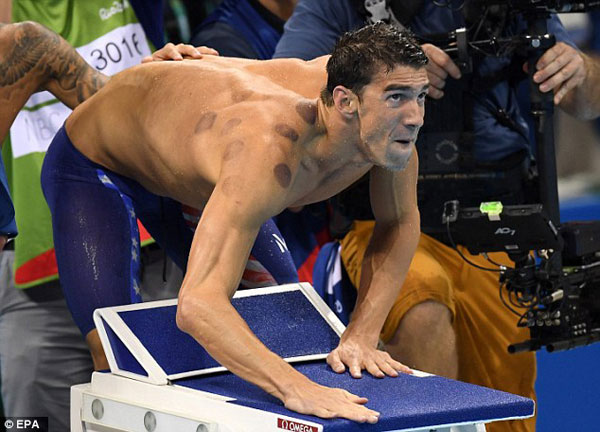 |
|
Michael Phelps showed off large purple marks on his back as he urged on his team mates during the men's 4x100m Freestyle relay final race in Rio |
Those dark red spots dotting Olympians' shoulders and backs are not cigar burns. They're not perfectly circular hickeys either.
奧運健兒肩膀上和背上那些暗紅色的印記可不是被煙頭燙的,當然也不是圓形的吻痕。
Viewers watching the Olympics this weekend may have spotted the pepperoni-like bruises on athletes and wondered: What is that?
周末觀看奧運會的觀眾們或許發現運動員們身上有意大利香腸狀的印痕,那到底是什么呢?
Olympians at Rio have taken to cupping -- an ancient therapy that have mostly been used in Middle Eastern and Asian countries, especially China.
里約奧運會上的運動員愛上了拔火罐,這是一種古法治療,在中東和亞洲國家,尤其是中國,十分常見。
The therapy consists of having round glass suction cups that are warmed, then placed on sore parts of the body. The placement of the glass cup creates a partial vacuum, which is believed to stimulate muscles and blood flow, while relieving pain.
這種療法需要使用高溫加熱過的圓形玻璃吸杯,把它扣在疼痛的身體部位。這種放置方法會形成部分真空,據說這樣能舒展肌肉,促進血液流通,從而緩解疼痛。
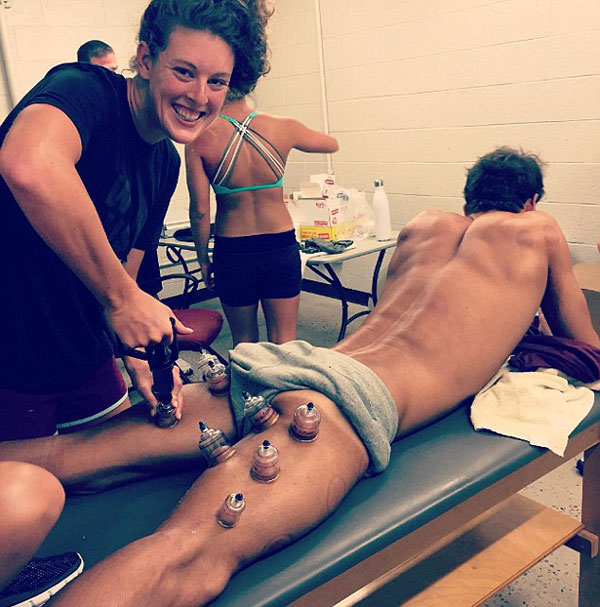 |
|
菲爾普斯接受拔罐治療 |
Michael Phelps, US gymnast Alex Naddour and Belarus swimmer Pavel Sankovich have all posted pictures of their polka dotted limbs and backs.
邁克爾?菲爾普斯、美國體操運動員艾利克斯?拿度亞以及白俄羅斯游泳運動員帕維爾?桑科維奇都曾經曬過他們有圓點印記的四肢和背部。
Sankovich wrote earlier this summer on his Instagram account: "Cupping is a great recovery tool," with a photo of his thighs covered in suction cups. Former Olympic swimmer Natalie Coughlin has also previously posted pictures of herself going through a cupping therapy.
桑科維奇剛入夏時在Instagram上寫道:“拔火罐真是療傷利器,”配圖是一張他扣著吸杯的大腿照片。前奧運會游泳選手娜塔莉?考芙琳之前也發過她拔火罐的照片。
It's not the first time cupping has made the rounds. Celebrities like Jennifer Aniston, Gwyneth Paltrow and Jessica Simpson have all been spotted with the marks in previous years.
拔火罐流行起來,這也不是第一回了。之前,詹妮弗?安妮斯頓、格溫妮絲?帕特洛以及杰西卡?辛普森等明星都拔過火罐。
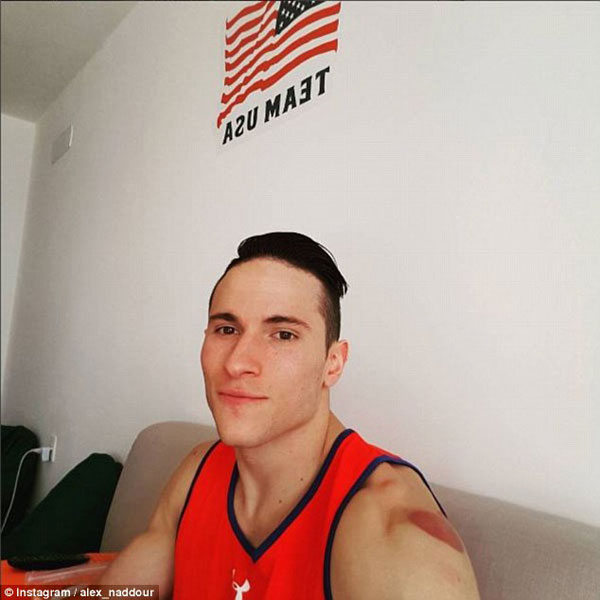 |
|
美國體操運動員艾利克斯?拿度亞肩上的紅色拔罐印記 |
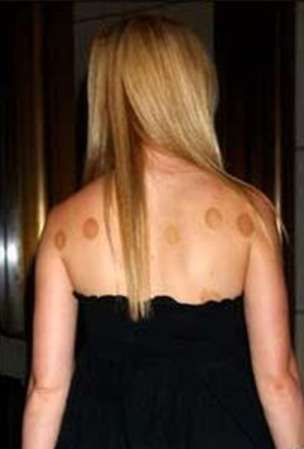 |
| 2004年,格溫妮絲?帕特洛后背上布滿火罐印記 |
Cupping is not new, it's ancient
拔火罐不是什么新時尚,而是老法子
The practice of cupping has been mentioned in ancient Greek and Egyptian texts.
古希臘和古埃及的文獻中都提到過拔火罐。
In traditional Chinese medicine, cupping dates back at least 2,000 years, according to a 2012 analysis published in the journal PLOS One. It is believed to restore the flow of "qi" -- the life force.
2012年《公共科學圖書館?綜合》期刊上發表的一篇分析論文稱,在中醫系統中,拔火罐擁有至少2000年的歷史。據說,這能幫人補“氣”。
In recent years, cupping therapy has been used for people suffering all sorts of ailments including shingles, facial paralysis, cough and difficulty breathing and acne. But cupping is most commonly used to treat pain, according to the analysis.
最近幾年,火罐療法被用于治療各種病痛,比如帶狀皰疹、面神經癱瘓、咳嗽、呼吸困難以及痤瘡。分析論文指出,火罐最廣泛應用于減緩疼痛。
One small study on cupping found that the cupping marks generally fade after two to four days.
一項關于火罐的小型研究發現,火罐印記基本會在二到四天內逐漸消失。
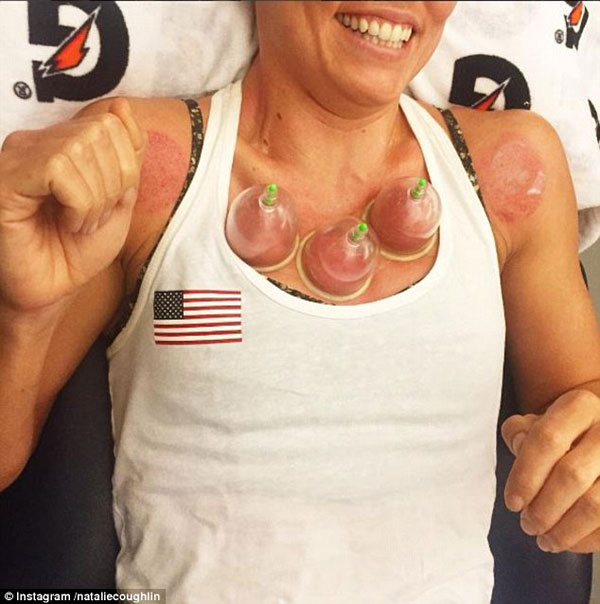 |
|
美國前游泳選手娜塔莉?考芙琳也曾經在社交媒體分享過拔罐的照片 |
Olympians like fads, too
奧運健兒也追逐時尚潮流
Every Olympics seems to have trendy items meant to help athletes, from high-tech swimsuits to the bright kinesio tape that made a scene in the London 2012 games. The tape appears to be back in Rio.
似乎每屆奧運會都有幫助運動員的新潮物品,從高科技泳裝到風靡2012年倫敦奧運會的肌內效貼布。這次里約奧運會也有運動員使用了這種貼布。
Unlike athletic tape, kinesio tape is thin and pliable, and meant to keep injured joints from bending to prevent further injury. The tape is used to prevent excessive protraction injuries, for example, shoulder problems from activities including playing tennis.
肌內效貼布不是普通的體育運動訓練貼布,它很輕薄而且柔韌,用于防止受傷關節彎曲,防止傷情加重。這種貼布能防止過度拉傷,比如打網球等造成的肩膀問題。
But the scientific evidence on kinesio tape is thin, according to a review published in the journal The Physician and Sportsmedicine. Studies showed that it improved pain and range of motion shortly after the injury, but the tape didn't make a difference in the long run.
但是《身體與體育醫學》期刊的一篇評論表示,肌內效貼布的科學依據不是很充分。研究表明它能在受傷后短時間緩解傷痛,增大活動范圍,但是長期作用不明顯。
Vocabulary
hickey:唇印
made the rounds:串門拜訪,四處走動
上一篇 : 奧運獎金哪家強?印尼是德國17倍
下一篇 :
分享到
關注和訂閱


電話:8610-84883645
傳真:8610-84883500
Email: languagetips@chinadaily.com.cn